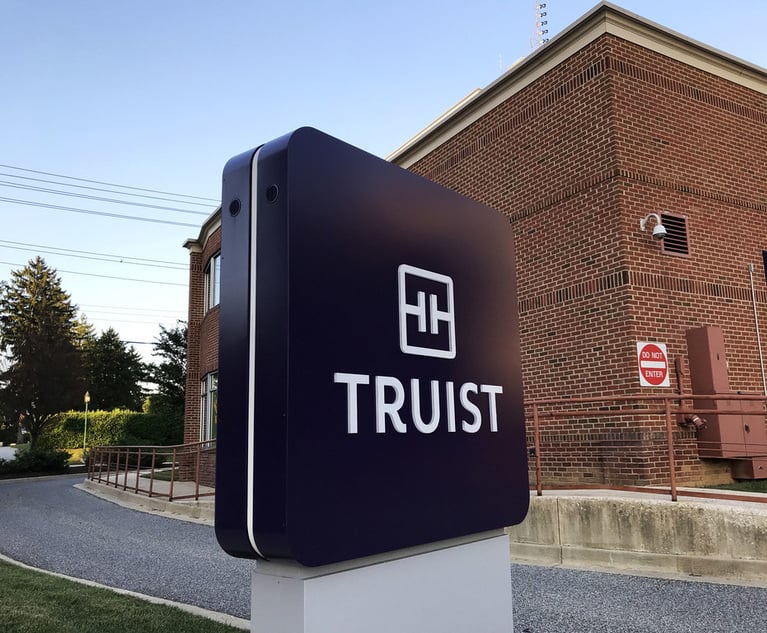Data Breach Victims Now Have Standing to Sue in Georgia
The decision is interesting in many respects, not the least of which was the court's tacit acknowledgment that it did not particularly like the outcome.
March 23, 2020 at 02:02 PM
4 minute read
 John Amabile (from left), Michael Binns and David Pardue of Parker Poe's Atlanta office. (Courtesy photos)
John Amabile (from left), Michael Binns and David Pardue of Parker Poe's Atlanta office. (Courtesy photos)
Data breach lawsuits remain an issue of high concern for businesses in 2020. Surveys indicate that many CEOs, including those of mid-market companies, rank the risk of data breaches as among their highest risk concerns for the foreseeable future. (These surveys occurred before the COVID-19 crisis.)
In Georgia, the state Supreme Court late last year issued a ruling that will significantly raise the risks of data breach litigation for companies that have suffered a security breach and, in turn, will likely come with an increase in legal spend associated with defending such lawsuits. It also might serve to make Georgia state courts a favored venue for bringing data breach litigation.
The Georgia Supreme Court issued a ruling on Dec. 23 making it significantly easier for a plaintiff to sue a company that was the victim of a hacker's attack resulting in the loss of personally identifiable information. In Collins v. Athens Orthopedic Clinic, a medical clinic was a victim of a security breach and ransom effort, which it refused to pay. It notified patients that their personal information had been compromised. A class action was filed against the clinic by two of the individuals whose information was stolen. The clinic moved to dismiss the complaint on the grounds that the plaintiffs did not have the type of substantiated harm sufficient to state a claim for relief. This is standard operating procedure in lawsuits alleging harm arising from breaches of a company's data security, although the issue has created a split among federal appellate courts that will likely lead to review by the U.S. Supreme Court at some point.
The Georgia Supreme Court weighed in on the side of the plaintiffs, holding that a complaint merely alleging that an individual's private information was compromised, creating an "imminent and substantial" risk of identity theft, permitted the lawsuit to proceed. The decision is interesting in many respects, not the least of which was the court's tacit acknowledgment that it did not particularly like the outcome. On the one hand, the court took pains to make clear that it was basing its ruling only on the grounds that this was simply a motion to dismiss and the standard is intended to be a low bar. A plaintiff must only be able to show that it could succeed "under any provable facts" which could be asserted to support the claim. In that respect, the court was obviously swayed by the verified allegation that personal information had actually been obtained by bad actors and that the risk of identity theft was "imminent and substantial."
On the other hand, the court also made the point in several spots that this was not a motion for summary judgment or a motion to certify a class, motions for which a plaintiff would have to provide some evidence to permit the claim to advance. The decision also could be read as providing not only a road map for how to plead a complaint that will survive a motion to dismiss, but also as guidance on how to successfully defend against such claims on the merits.
In short, the court seems to acknowledge both that it is possible for a plaintiff to state a claim for damages arising from having his or her private information stolen while also acknowledging the plaintiff may not be likely to succeed on the ultimate merits of the claim.
The potential impact of this ruling on companies doing business in Georgia, however, cannot be understated. This decision makes it more likely that a motion to dismiss for failure to state a claim will not be a quick exit ramp for a company who is sued because it suffered a security breach. This will directly result in a defendant company incurring significant legal expenses having to defend the lawsuit. That, of course, is exactly the type of scenario where a company who suffers a data breach will have to balance potential expenses of litigation against reasonable efforts to resolve the dispute, a less than ideal place for business to be.
And it will likely result in Georgia state courts and those companies doing business in Georgia seeing an uptick in data security litigation, at least until the U.S. Supreme Court weighs in on the type of substantiated harm sufficient to state a claim for relief.
John Amabile, Micheal Binns, and David Pardue are litigators in Parker Poe's Atlanta office.
This content has been archived. It is available through our partners, LexisNexis® and Bloomberg Law.
To view this content, please continue to their sites.
Not a Lexis Subscriber?
Subscribe Now
Not a Bloomberg Law Subscriber?
Subscribe Now
NOT FOR REPRINT
© 2025 ALM Global, LLC, All Rights Reserved. Request academic re-use from www.copyright.com. All other uses, submit a request to [email protected]. For more information visit Asset & Logo Licensing.
You Might Like
View All
Second Circuit Ruling Expands VPPA Scope: What Organizations Need to Know
6 minute read
Expert: Georgia Tech Faces Uphill Battle in Suit Over Cybersecurity Failures

Delta Facing Class Action Lawsuit Over Tech Outage; Customers Seeking Refunds
3 minute read
Milberg Files Data Breach Suits Against North Carolina-Based Truist Bank
Law Firms Mentioned
Trending Stories
Who Got The Work
J. Brugh Lower of Gibbons has entered an appearance for industrial equipment supplier Devco Corporation in a pending trademark infringement lawsuit. The suit, accusing the defendant of selling knock-off Graco products, was filed Dec. 18 in New Jersey District Court by Rivkin Radler on behalf of Graco Inc. and Graco Minnesota. The case, assigned to U.S. District Judge Zahid N. Quraishi, is 3:24-cv-11294, Graco Inc. et al v. Devco Corporation.
Who Got The Work
Rebecca Maller-Stein and Kent A. Yalowitz of Arnold & Porter Kaye Scholer have entered their appearances for Hanaco Venture Capital and its executives, Lior Prosor and David Frankel, in a pending securities lawsuit. The action, filed on Dec. 24 in New York Southern District Court by Zell, Aron & Co. on behalf of Goldeneye Advisors, accuses the defendants of negligently and fraudulently managing the plaintiff's $1 million investment. The case, assigned to U.S. District Judge Vernon S. Broderick, is 1:24-cv-09918, Goldeneye Advisors, LLC v. Hanaco Venture Capital, Ltd. et al.
Who Got The Work
Attorneys from A&O Shearman has stepped in as defense counsel for Toronto-Dominion Bank and other defendants in a pending securities class action. The suit, filed Dec. 11 in New York Southern District Court by Bleichmar Fonti & Auld, accuses the defendants of concealing the bank's 'pervasive' deficiencies in regards to its compliance with the Bank Secrecy Act and the quality of its anti-money laundering controls. The case, assigned to U.S. District Judge Arun Subramanian, is 1:24-cv-09445, Gonzalez v. The Toronto-Dominion Bank et al.
Who Got The Work
Crown Castle International, a Pennsylvania company providing shared communications infrastructure, has turned to Luke D. Wolf of Gordon Rees Scully Mansukhani to fend off a pending breach-of-contract lawsuit. The court action, filed Nov. 25 in Michigan Eastern District Court by Hooper Hathaway PC on behalf of The Town Residences LLC, accuses Crown Castle of failing to transfer approximately $30,000 in utility payments from T-Mobile in breach of a roof-top lease and assignment agreement. The case, assigned to U.S. District Judge Susan K. Declercq, is 2:24-cv-13131, The Town Residences LLC v. T-Mobile US, Inc. et al.
Who Got The Work
Wilfred P. Coronato and Daniel M. Schwartz of McCarter & English have stepped in as defense counsel to Electrolux Home Products Inc. in a pending product liability lawsuit. The court action, filed Nov. 26 in New York Eastern District Court by Poulos Lopiccolo PC and Nagel Rice LLP on behalf of David Stern, alleges that the defendant's refrigerators’ drawers and shelving repeatedly break and fall apart within months after purchase. The case, assigned to U.S. District Judge Joan M. Azrack, is 2:24-cv-08204, Stern v. Electrolux Home Products, Inc.
Featured Firms
Law Offices of Gary Martin Hays & Associates, P.C.
(470) 294-1674
Law Offices of Mark E. Salomone
(857) 444-6468
Smith & Hassler
(713) 739-1250






